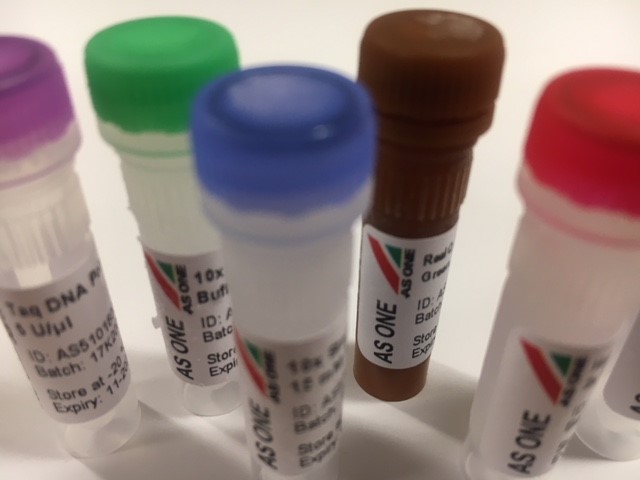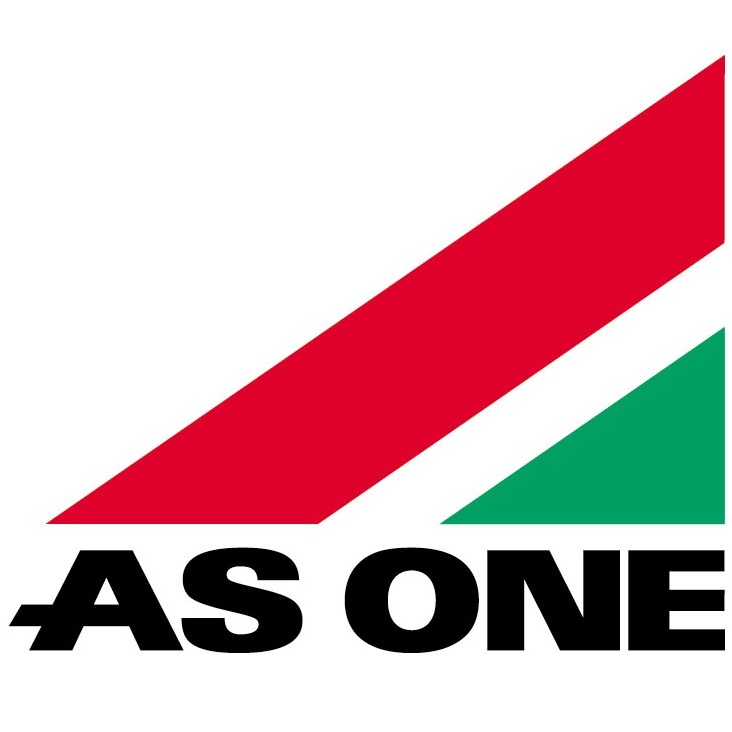Description
Hot Start Taq Polymerase,
2x Master Mix Blue
with HS Buffer II
| Cat. No. | Size Reactions | HS Taq, 2x Master Mix (Buffer II) Blue | Final MgCl2
Conc. |
| AO290803 | 500 | 2x HS Buffer II Mix Blue | 1.5mM |
| AO290804 | 1,000 | 2x HS Buffer II Mix Blue | 1.5mM |
| AO290806 | 2,500 | 2x HS Buffer II Mix Blue | 1.5mM |
| AO290807 | 5,000 | 2x HS Buffer II Mix Blue | 1.5mM |
| AO290808 | 10,000 | 2x HS Buffer II Mix Blue | 1.5mM |
| AO290809 | 20,000 | 2x HS Buffer II Mix Blue | 1.5mM |
Store at -20°C. For in-vitro laboratory use only
General Description
Hot Start Taq Polymerase Master Mix BLUE is a ready-to-use 2.0x master mix. Simply add primers, template, and water to successfully carry out primer extensions and other molecular biology applications.
AS ONE HS Taq Polymerase, NH4+ buffer system, dNTPs and magnesium chloride are present in HS Master Mix with HS Buffer II. Each reaction requires 25 µL of the 2.0x reaction mix. Simply add primers, template and water to a total reaction volume of 50 µL.
HS Taq Polymerase is a modified form of AS ONE Taq Polymerase, which is activated by heat treatment. A chemical moiety is attached to the enzyme at the active site, which renders the enzyme inactive at room temperature. Thus, during setup and the first ramp of thermal cycling, the enzyme is not active and misprimed primers are not extended. The result is higher specificity and greater yields when compared to standard Taq polymerases.
HS Master Mix offers several advantages; direct gel loading, no need to use separate loading dyes for electrophoresis and subsequent visualization. The chance of contaminating component stocks is eliminated. Reduction of reagent handling steps leads to better reproducibility. Standard tests can be set up with the confidence that results will be consistent every time.
Composition of
2.0x HS Master Mix II Blue
Tris-HCl, pH 8.5, Balanced KCl/(NH4)2S04, 3 mM MgCl2, 0.2% Tween 20Ò, 0.4 mM dNTPs, 0.2 units/µL HS Taq Polymerase, Inert Blue Dye, Stabilizer
Suggested Protocol using HS Master Mix Blue
This protocol serves as a guideline for primer extensions. Optimal reaction conditions such as incubation times, temperatures, and amount of template DNA may vary and must be individually determined.
Notes:
- Set up reaction mixtures in an area separate from that used for DNA preparation or product analysis.
- The table below shows the reaction set up for a final volume of 50 m
- Important: Mix the solutions completely before use to avoid localized concentrations of salts.
- Set up each reaction as follows:
Component |
Vol./Reaction | Final Conc. |
| 2x HS Buffer II Mix Blue | 25 µL | 1x |
| Primer A | Variable | 0.1–1.0 µM |
| Primer B | Variable | 0.1–1.0 µM |
| Distilled Water | Variable | – – – – |
| Template DNA | Variable | Variable |
| TOTAL volume | 50 µL | – – – – |
- Mix gently by pipetting the solution up and down a few times.
- Program the thermal cycler according to the
manufacturer’s instructions.
- Each program must start with an initial heat
activation step at 95°C for 15 minutes.
For maximum yield and specificity, temperatures and cycling times should be optimized for each new template target or primer pair.
A typical thermal cycling program is shown below:
95°C for 15 min. Activate HS Taq Polymerase
25-35 cycles:
95°C 20-30 sec. Denature template
50-65°C 20-40 sec. Anneal primer
72°C 30 sec. Elongation
72°C for 5 min. Elongation
- Place the tubes in the thermal cycler and start the reaction.



Reviews
There are no reviews yet.